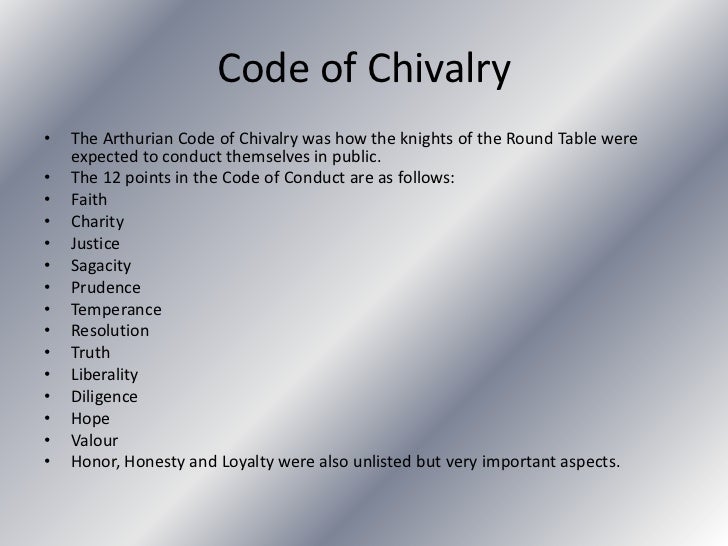
He was to be courteous, especially to women brave loyal to his leaders and concerned about the welfare of his subordinates, or those of lesser rank and position. Each knight had to swear that he would defend the weak, the poor, widows, orphans, and the oppressed.
#Chivalry code for knights code#
As the pope's warriors, knights were bound by a code of honor, the code of chivalry.
#Chivalry code for knights free#
In many early texts, "chivalry" refers simply to the actual ranks of a mounted army, that is, to "troops." In time, though, the word came to stand for much more, in particular, a code of behavior and ethics to which all knights were expected to hold.ĭuring the Crusades the Pope called on young men from wealthy families to go on a holy war against Muslims and free Jerusalem from their rule. Only those who could control and direct the strength and speed of a horse were likely to survive armed combat, although peasants and commoners, in contrast to members of the nobility, had to take their chances on foot. It comes from the Old French word chevalerie, which means something like "skill in handling a horse." In an age before guns, gunpowder, and cannons, warfare with lances and swords required the knight to battle his opponent personally and up close. The Code of Chivalry was admired and understood by all.The word "chivalry" originates in the Romance languages (Italian, Spanish, and French).

By the 14th century CE the notion of chivalry had become more romantic and idealised, largely thanks to a plethora of literature on the subject and so the code persisted right through the medieval period with occasional revivals thereafter.ring the Medieval times and era. Evolving from the late 11th century CE onwards, essential chivalric qualities to be displayed included courage, military prowess, honour, loyalty, justice, good manners, and generosity – especially to those less fortunate than oneself. Chivalry was, in addition, a religious, moral and social code which helped distinguish the higher classes from those below them and which provided a means by which knights could earn themselves a favourable reputation so that they might progress in their careers and personal relations. In medieval Europe, a code of ethics known as chivalry developed which included rules and expectations that the nobility would, at all times, behave in a certain manner. Thou shalt be everywhere and always the champion of the Right and the Good against Injustice and Evil. Thou shalt be generous, and give largesse to everyone.ġ0. Thou shalt never lie, and shalt remain faithful to thy pledged word.ĩ. Thou shalt perform scrupulously thy feudal duties, if they be not contrary to the laws of God.Ĩ. Thou shalt make war against the infidel without cessation and without mercy.ħ. Thou shalt not recoil before thine enemy.Ħ. Thou shalt love the country in which thou wast born.ĥ. Thou shalt respect all weaknesses, and shalt constitute thyself the defender of them.Ĥ. Thou shalt believe all that the Church teaches and thou shalt observe all its directions.ģ. He would also swear allegiance to his lord, who would knight the squire by dubbing or patting him on each shoulder with the flat side of his sword.ġ. He would attend a church service called a mass, have his sword and shield blessed and vow ‘to defend the weak, the orphan, the widow and women should receive his special care’. His shoes and hose, or tights, were black, symbolising death. Over this tunic he would wear a robe to show his willingness to shed blood for God and for his lord. He would then confesses sins to a priest, bathe and dress in a white tunic, which signified his purity. He would begin by purifying himself through prayer and fasting for a day and a night. A squire would be dubbed a knight after an elaborate ceremony. Would have decided that he was ready for knighthood. He would have either proved himself in battle or his lord.

A squire would usually be made a knight at about the age of twenty.


 0 kommentar(er)
0 kommentar(er)
